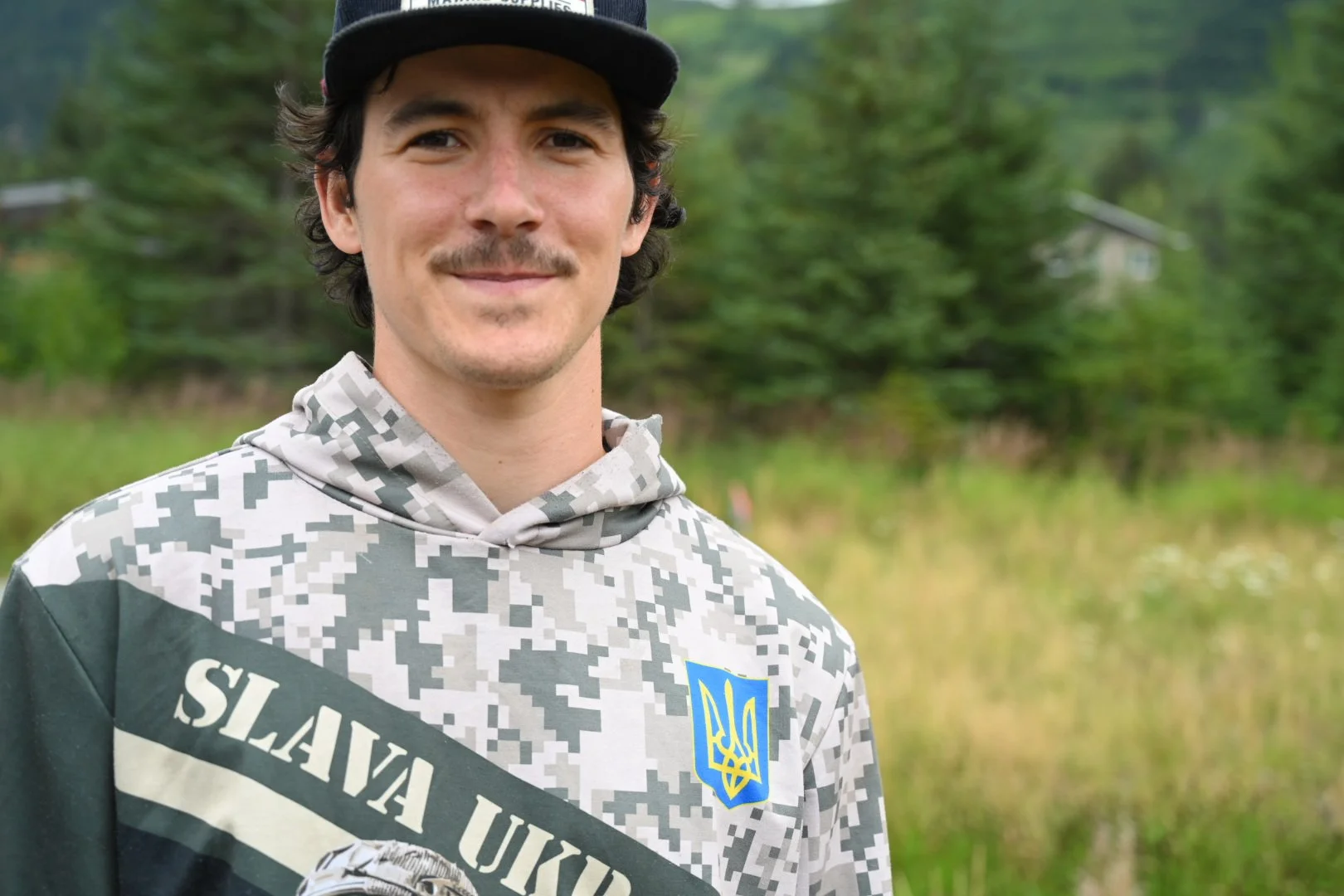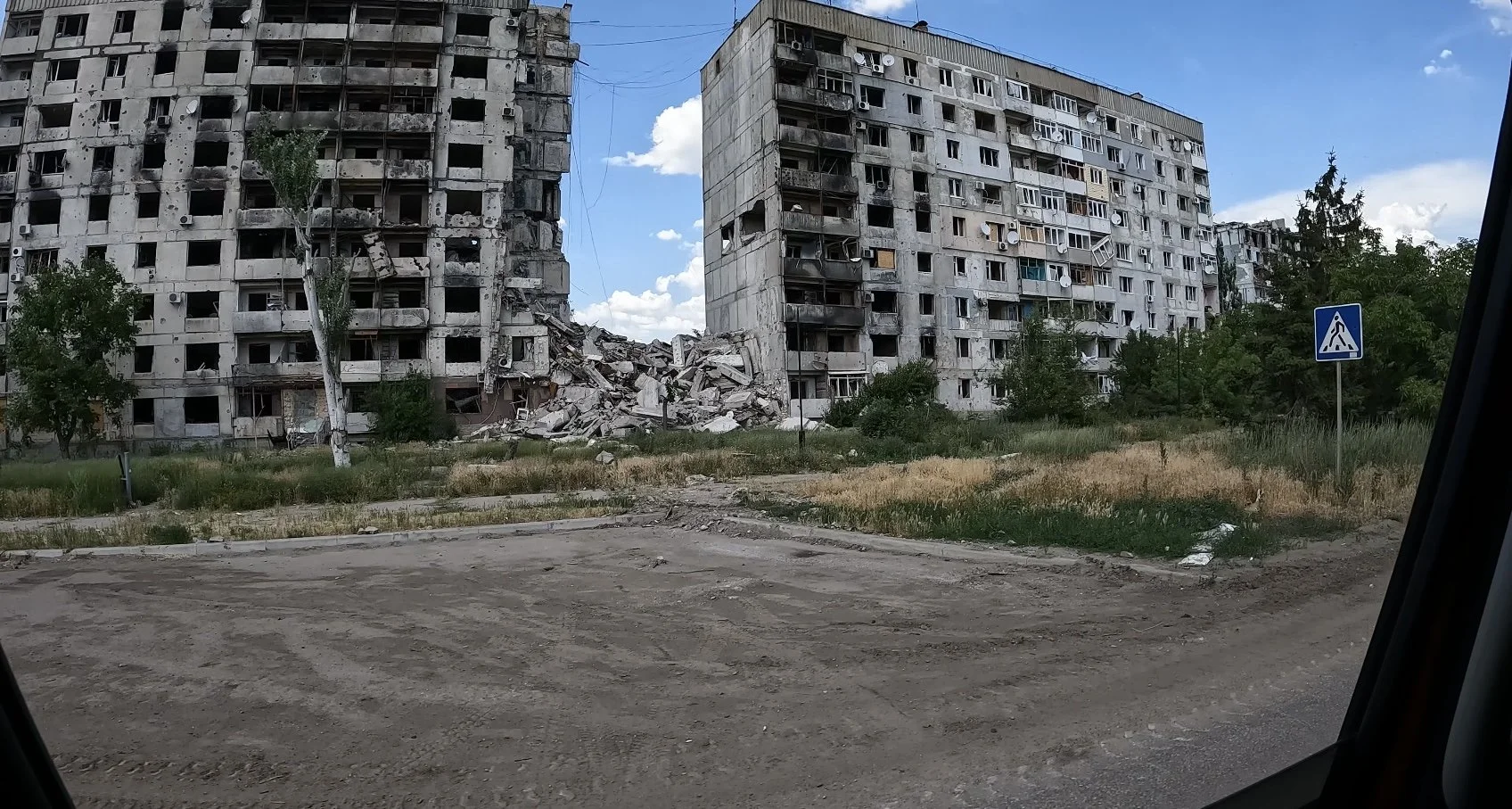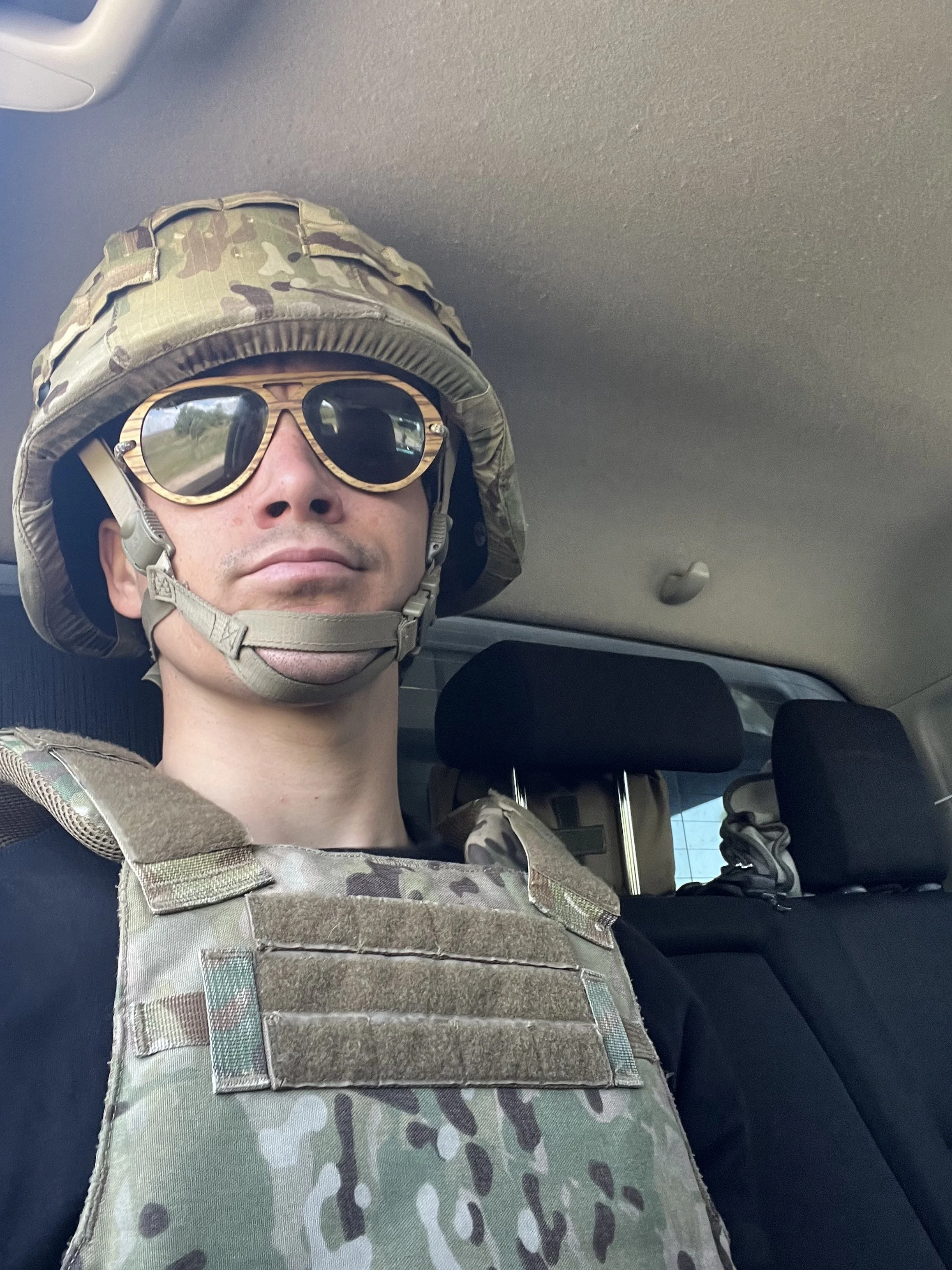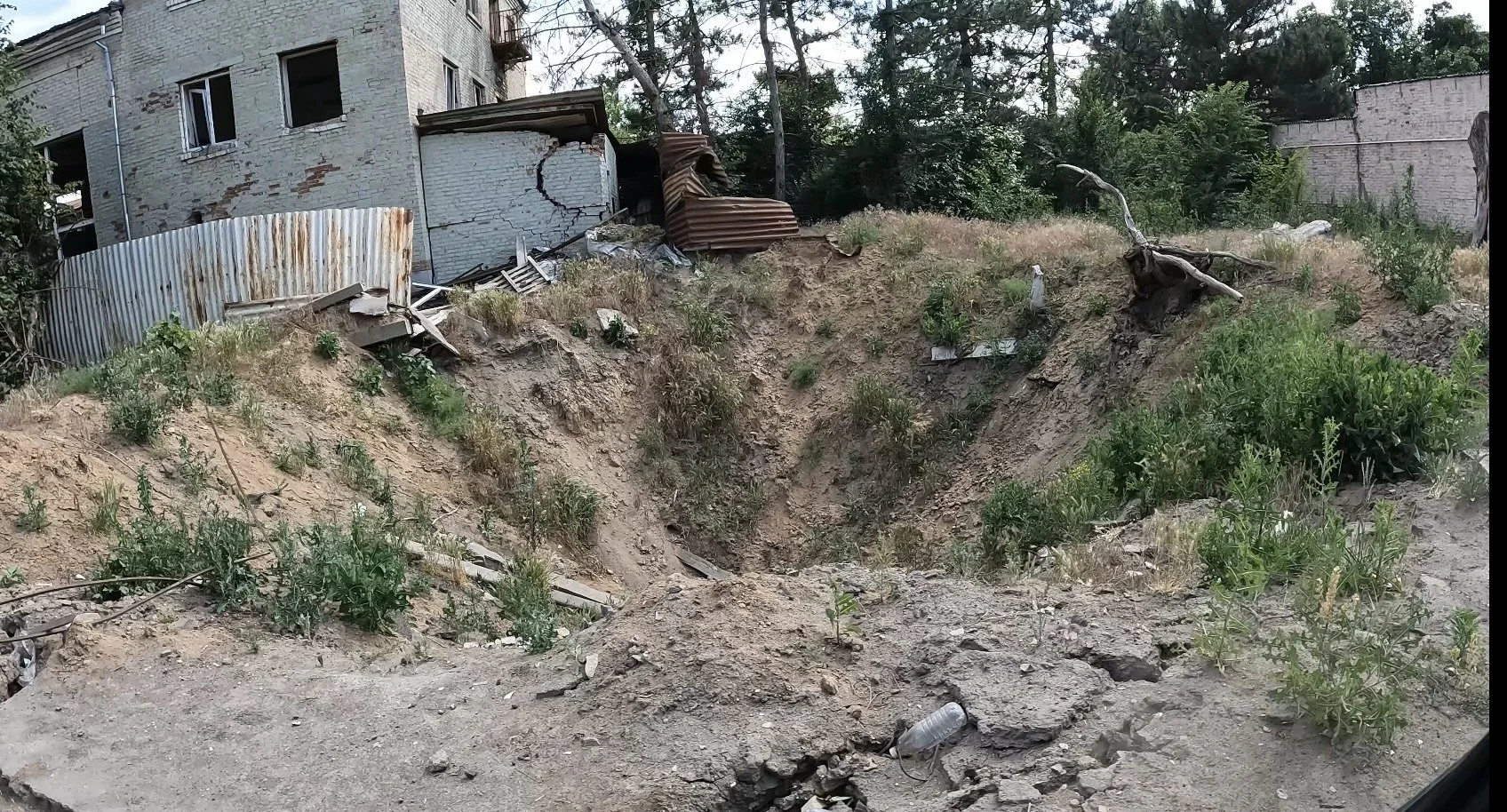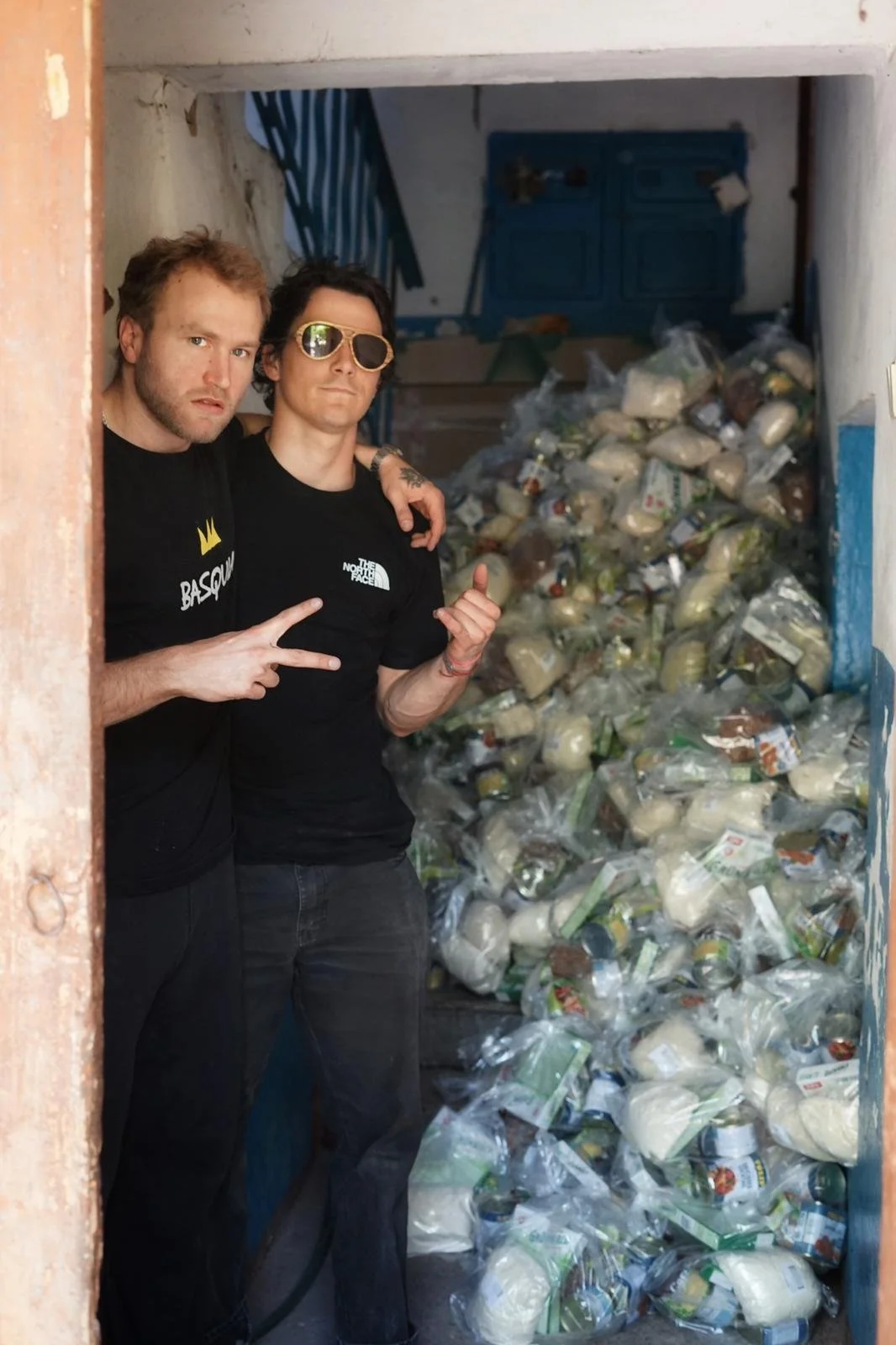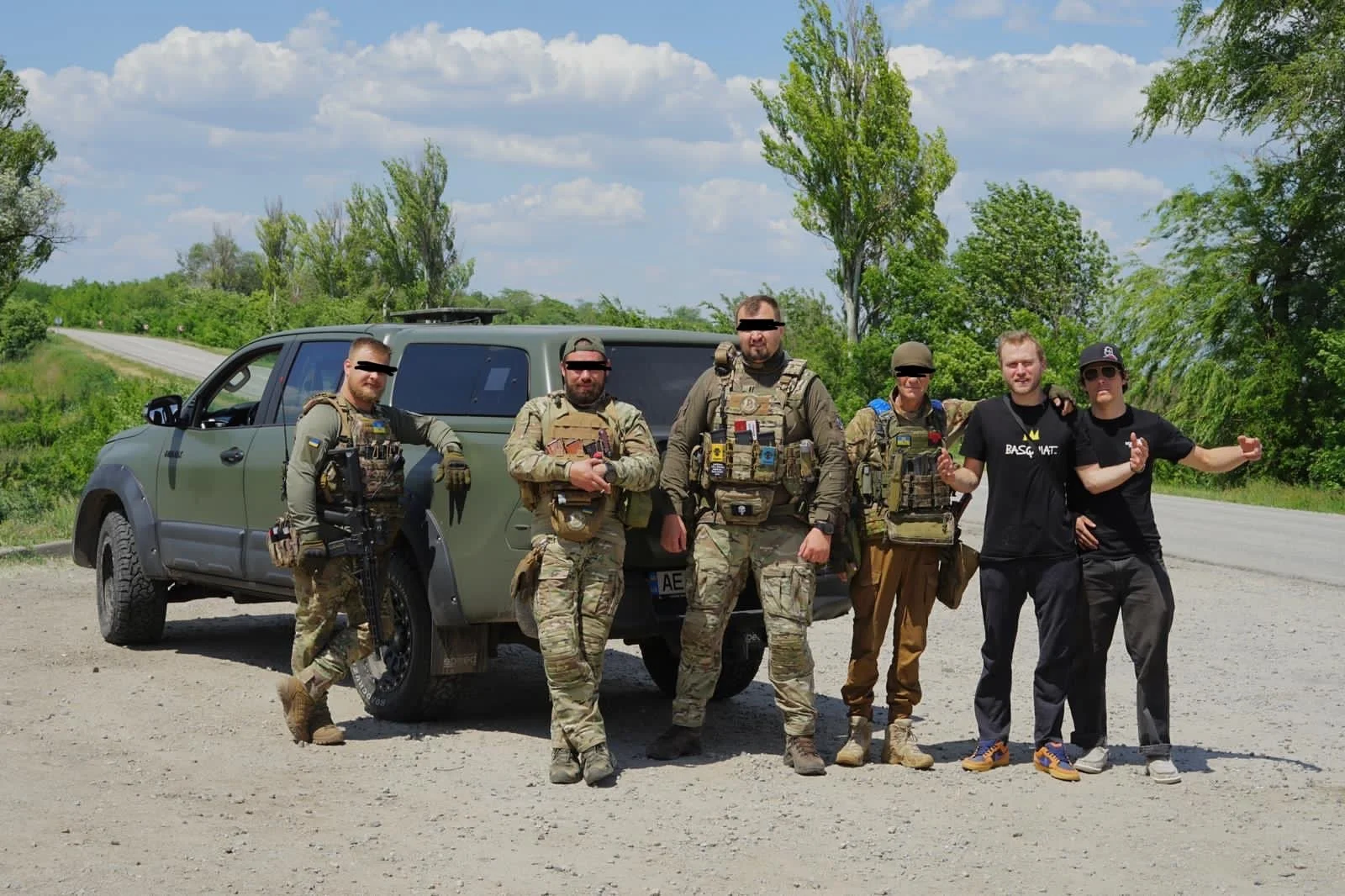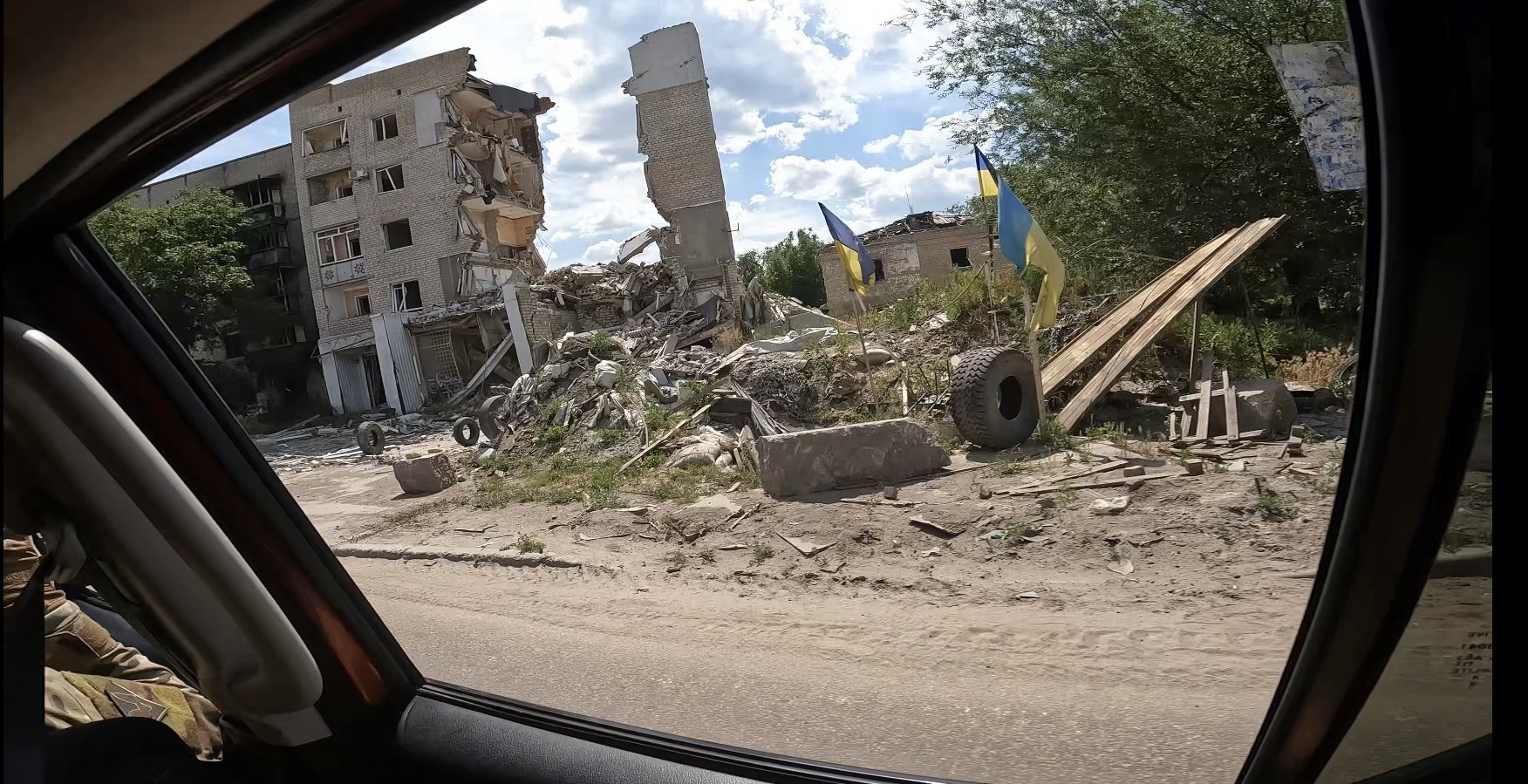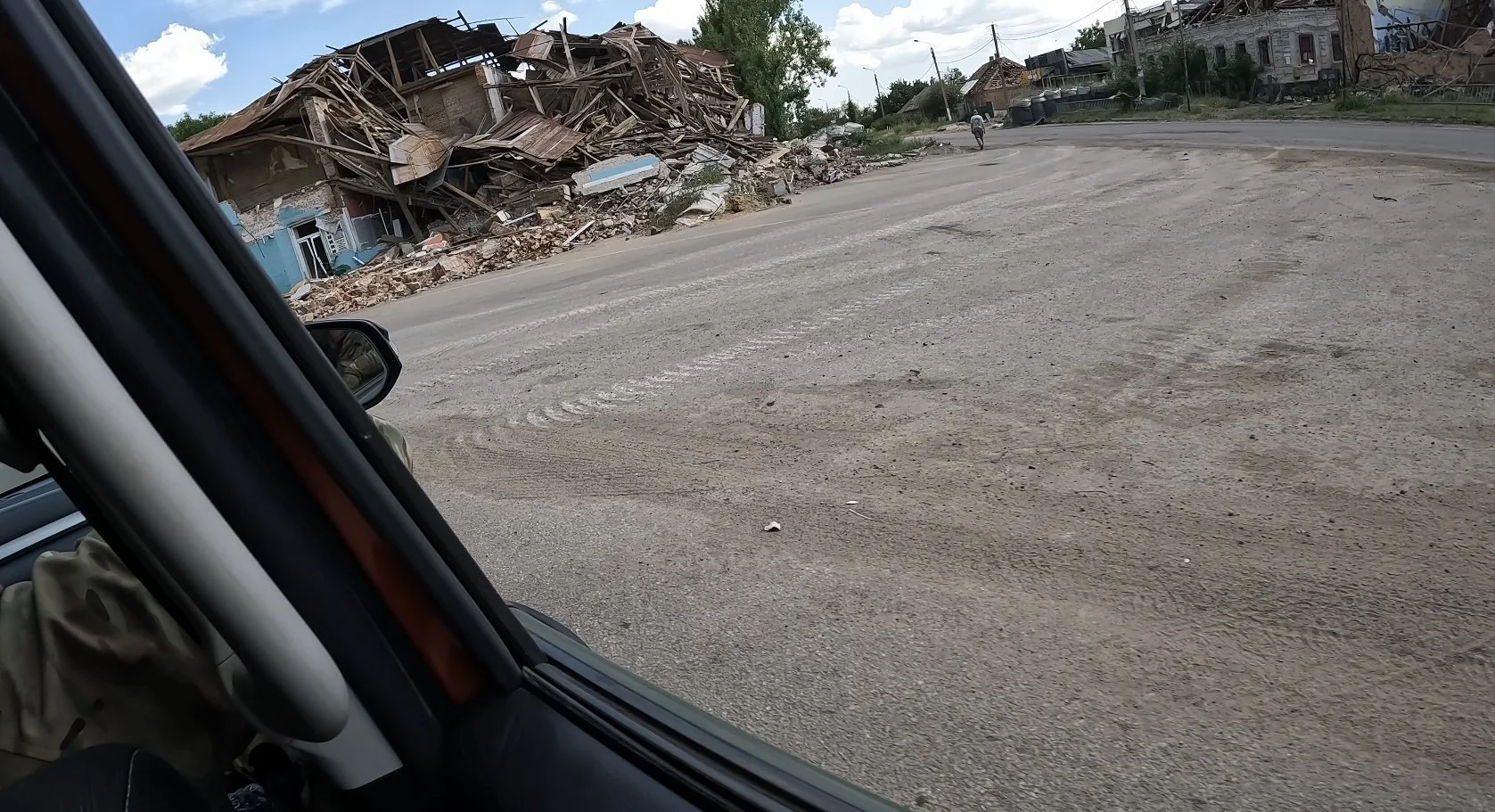Local Ski Patroller Finds Fear, Loathing, and Adventure in War Zones
Local ski patroller Kyle Beckler. Beckler stayed a month freelancing with a nonprofit group handling food donations. (Photos furnished by Kyle Beckler)
By Soren Wuerth
TNews Editor
Local ski patroller Kyle Beckler rides shotgun in a van as it rattles along a dusty strip near the Ukrainian frontline in its war against Russia.
A bridge comes into view, pieces missing, one span tilted into a river.
The white van, a rented jalopy with a window missing from a shrapnel blast, carries cans of meat and packages. Its glove compartment is duct-taped shut.
The van passes buildings with skeletal roofs and crumbled walls. It passes a rusted, wheel-less transport truck slumped on the side of a road with a door hanging open.
What looks like a school has blackened, pocketed walls and its windows are punched out.
A bombed apartment building near the frontlines in Ukraine's war with Russia.
Filming himself inside the cluttered van, Beckler, 24, eyebrows raised, teeth bared, has the look of a skier about to drop into a steep mountain couloir.
When the van door opens a small crowd of villagers is gathered in the shade of a tree. Beckler, wearing dark sunglasses, flashes a hard rock salute for his camera to the rippling babble of Ukrainian. Bags are handed out. The van slowly empties its cargo.
Beckler's freelance humanitarian work in Ukraine feels, in videos, as adrenaline-laced as "speed-flying", the extreme, high-speed paragliding to which Beckler says he's "addicted." (He's flown more than 50 trips down the face of Max's Mt. in Girdwood alone.)
When we meet over kombuchas at the Girdwood Brewery, Beckler, 24, sounds winded and gasps occasionally.
"I think I have a lung infection and I probably shouldn't have hiked today," Beckler says.
Troops insisted Beckler wear body armor, he says.
The Ukrainian Front: ghosts, explosions and tracers
Beckler has made three trips to Ukraine to load shipments, run food to war-weary households, and to do volunteer work freelancing for "Conscience International," an organization for which his father provided marketing.
Three years ago, Beckler says, he had "time off from doing seasonal jobs, and I just was like, hey, I want to give all the good energy that I have back. One thing led to another, and I met the gentleman that ran the organization."
Jim Jennings, Conscience International's founder, whom Beckler described as an "OG humanitarian guy", gave Beckler a plane ticket to Hungary. From there he would go to an aid site in Romania to help Ukrainian refugees. As it turned out, the refugees had been displaced for a youth summer camp.
Restless, Beckler took a train to Odesa, a historic, coastal city in southwestern Ukraine that had been largely spared from Russian attacks. It had been a year since the war started. Beckler stayed for a month working with a nonprofit group handling food donations.
"One of the many cool things I saw was how these people worked together. ...They grind. They go hard, smoke a lot of cigs, and they can a lot of food packets," he says.
During an interview, Beckler hands a flash drive across the table filled with 128 fish-eyed videos and still images from GoPro and iPhone cameras.
One clip shows a line of semi trucks that disappears into the horizon as the van speeds alongside. In another clip small, boxy, comical cars line up for a checkpoint.
The collection shows his Ukraine relief work from the mundane—food warehouse, boxes in a van, deliveries, and skateboarding—to the unpredictable and to the macabre.
In a shack, a bald man uses a chainsaw to make a black and orange "RIP" plywood grave sign. Maybe the placard is for a Halloween party shown in another clip, where a man plays a mournful song on a saxophone in a dark, blue-lit room filled with balloons and ghostly plastic statues. The ghosts pulse red while Michael Jackson's "Thriller" plays silently on a big screen.
A roadside crater.
The video was taken the night Beckler helped throw a Halloween party with candy, pizza, toys, and chips. "We have a DJ coming," a man says off camera. "It's the safest place we're gonna find. No windows. All bricked up."
Beckler and his friends threw the Halloween party in a bunker in Kherson, a southern port city taken by Ukrainian forces in 2022 that fell under constant shelling. He said he wanted an event "to give kids there a little bit of hope and happiness."
At the party, he says a man approached him and said, "Oh, you like killing Jews, do you?"
"I didn't put it together until I realized that this was exactly around the time, maybe a couple of days later, of the incident that happened in Israel at the festival," Beckler says. He thought later it was his t-shirt that set the man off. He wore a paragliding shirt he'd bought in Colombia.
Beckler thinks the man associated the design on his shirt with the October 2023 armed assault on Israeli settlements and a festival. The Hamas attack sparked a campaign of retaliation by Israel against Palestinians living in the besieged Gaza Strip, a conflict Beckler would become more intimately aware of.
"I'm like, why is this guy taking this so drastically? This guy is probably filled with emotions living on the front line. Like, his house is very nice, one of the nicest houses there was around the area. His business was down there, too," says Beckler. "I'm like, man, that's what war does to you."
Other scenes in Beckler's video collection of his experiences in Ukraine depict tense night-time explosions. A series of blasts ends with a Tik Tok reel Beckler put together.
In another, the low thud of bombs and a rushing roar inside a speeding van— dash lights, headlights and highway—reverberate as it moves through banks of misting smoke.
Beckler with friend and colleague Luke Maddox, a veteran volunteer who has, according to Beckler, essentially moved to Ukraine.
One clip has the camera sweeping across an amber-lit street at night while voices murmur in the background. Suddenly there is a detonation. A woman yelps. The camera jolts. A person walking in the street below does not change pace. Cars keep driving. The camera swings to Beckler whose eyes bloom wide.
In the next clip, red tracers arc in the night sky like red sparks above a bonfire while an artillery rapport echoes somewhere in the distance.
"Didn't you feel afraid?"
"You know, I get asked that a lot," Beckler says.
"Why should I be afraid when I'm only there for a couple weeks to a month? For these people, this is their home," Beckler says, adding, "I guess there's always an inherent risk that I put myself in, and that risk can create a lot of emotions, but you got to figure out how to deal with those emotions. And I think with my work as a ski patroller and (being) a speed flyer as well, I can understand how to gauge risk."
Palestine or Bust
Beckler, a native of Denver, Colo., came to Girdwood four years ago, when he was 20, to find work commercial fishing and "for the true beauty and the mountains. And the skiing, really."
He took a job at a ski shop and then with Alyeska ski patrol. In between seasons working on the mountain and fishing, he speedflies and travels.
"I guess I just felt this urge in my heart to give back, mainly because, living in Alaska, you live this perfect life, at least for me. I guess not everyone has a perfect life. But, you know, I'm able to go home to a safe place. I'm able to eat whenever I want to eat. I'm even able to walk wherever I want. And not a lot of people are able to do that. I have all this good energy, and I needed to figure out a way to give it back," he says.
After his third trip to Ukraine, funding began to dry up, so Beckler pivoted to another theater of conflict—Palestine's West Bank.
Jennings, whose humanitarian work with Conscience International has centered on the Middle East, hooked up Beckler with contacts in Bethlehem.
A group shot with Ukrainian soldiers.
Beckler flew to Munich, Germany then to Tel Aviv. Jennings told him to be prepared for multiple interrogations by Israeli officials.
"Jim was like, 'Hey, this is how you do it. This is the best case scenario of what happens and the worst case scenario that happens."
As Beckler was about to board his flight to Israel, he says he was pulled aside and "grilled".
"(They asked), 'Why are you here? What are you doing?' I don't know how I was able to pull it off, I mean, I basically lied. (I said), 'Like, hey, like, um. I'm a tourist. My dad came here 30 years ago and I am eager to see archaeological and religious sites. You know, I want to walk the path that Jesus did.' I just was able to hold it together," Beckler says.
In the West Bank, Beckler volunteered on an olive farm above Bethlehem for a nonprofit called Tent of Nations, one of the last remaining Palestinian farms in the region's foothills, where he fixed fences, watered trees and fed animals. The organization welcomes international travelers for volunteer work and, Beckler says, to act as a deterrent from the incursion of settlements.
Under far-right leader Benjamin Netanyahu, Israel settlements have been rapidly expanding in the West Bank, often by force. Beckler says the settlements are typically on higher ground, in the foothills, and while some Israeli homes in the settlements have swimming pools, Palestinian villagers need to collect rainwater.
"But also under Israeli law, it's illegal to have rain catchments. There's so many different rules that control these people," he says. "Nothing is set up for these people to thrive."
He said a "three-year rule" requires Palestinians to cultivate their farms for that time period. If you don't occupy and farm the land, authorities can confiscate it.
"It (sounds) pretty easy to stay on your land for three years, but when roadblocks are put up (and) when your bushes are burned..." Beckler trails off. He says where he worked about 500 olive trees were burned by settlers.
"(Settlers) cut the fences. They come in. (Palestinian farmers) were just constantly harassed," he says. "I have so much sympathy for the Palestinian people. I mean... God, it's terrible. They're treated like gum under their table."
During a second trip to Tent of Nations, Beckler encountered three different blockades abruptly bulldozed to prevent farmers from cultivating their crops.
Still, Beckler understands the Israeli perspective is deeply rooted.
"You know, it's a lot of grief, but you kind of have to tread lightly because, you know, you get different sides of the story," he says. "The only way you can form your opinions is by hearing from both sides."
When leaving Tel Aviv, Beckler says he was detained and interrogated by Israeli officials for three hours by four different people.
Asked if he sees parallels in the conflicts, Beckler says, "human hating human. You know, in the endgame, we're all human and it's just hate, and not being able to forgive. There's a lot of backstory in each conflict."
"There's a lot of things that have led to what is happening now. And I think in that sense, (the conflicts in Ukraine and Palestine) are uniquely different from one another," he says. "The thing with the West Bank gets just crazy. You're told this is the Holy Land. But so much blood has been shed for this land that's deemed holy."
Despite less hassle leaving Tel Aviv after a second trip (on the first trip he spent two weeks in the West Bank and stayed three weeks on another trip), Beckler doubts he'll return, even though he feels drawn to the area.
"I said I was a tourist twice and they asked, 'Why are you coming again as a tourist?' I said, 'I was only here for two weeks and I didn't experience as much as I wanted to.' I was trying to go to the Dead Sea and go farther up to Jericho. Okay, sweet. But now, (if I go) a third time, what am I going to say? ...they might start to catch on."
Ukrainian flags stand between destroyed buildings.
Beckler is raising money for his connections in Ukraine and promotes other non-profits.
I asked Beckler what it's like coming back to the United States with its material abundance and, for many, day-to-day problems that are relatively insignificant.
"If I try to go out and do, like, a music thing in Hope or around here... it's a crazy reality. There's one part of the world where people are laughing, hooting and hollering, and...
"Which is great. It's great. We should do that."
Beckler recommends supporting the following organizations: Conscience International, Rebuilding Alliance, World Central Kitchen and Doctors Without Borders. Beckler is raising funds for his freelance work through his Venmo account: Kyle-beckler00, 7204159551.
A resident walks past a flattened home.

